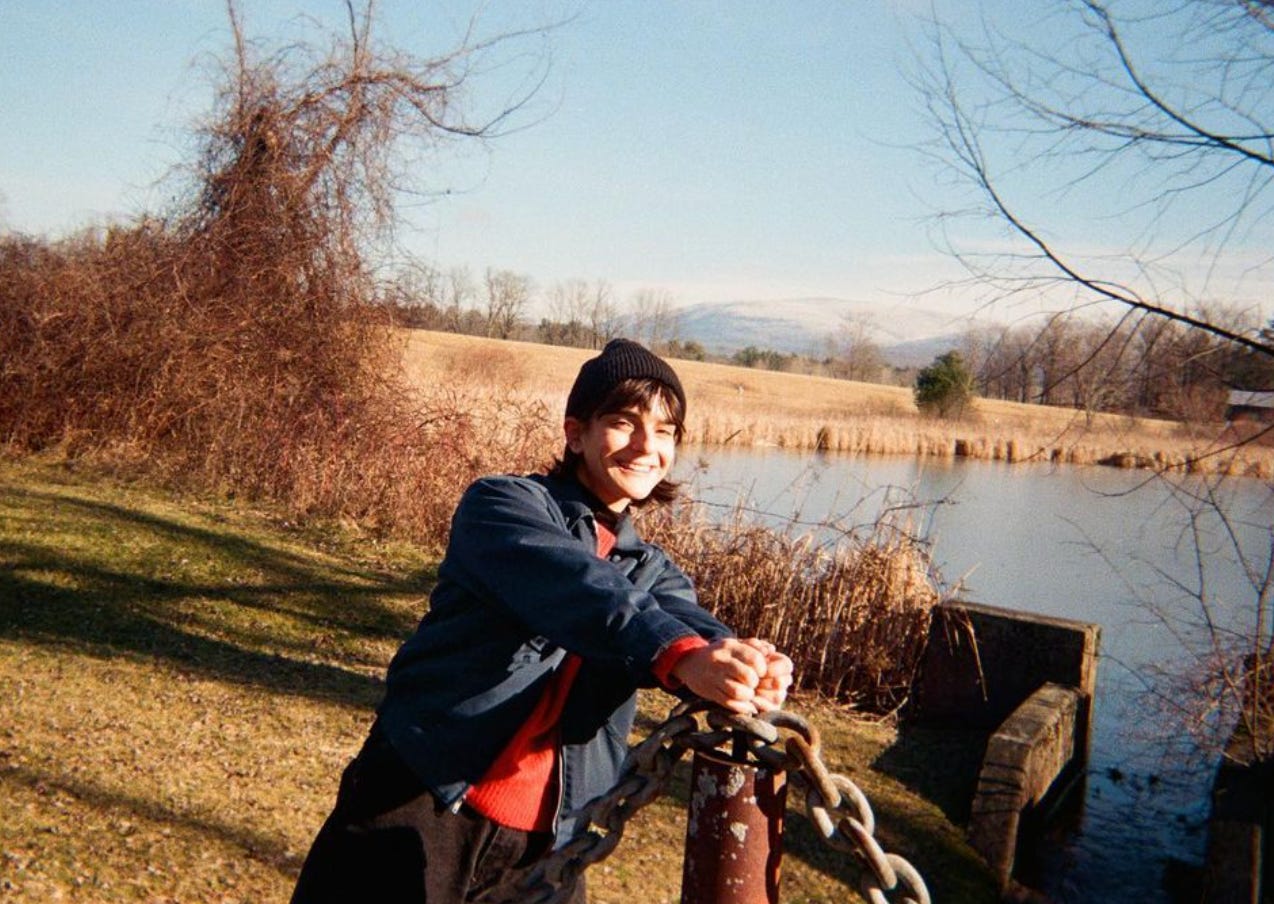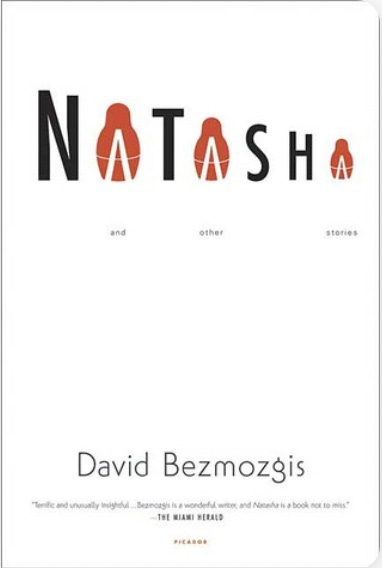All The Things She Said (Were Good) Guest Newsletter
By Diana Ruzova
One of the many nice things about being friends with writers is that you’re constantly hearing about books you haven’t read and feel perpetually like there’s more to read. I am currently in moving hell (done so soon, thank goddess) and asked my friend Diana Ruzova to come guest-curate a newsletter for me/us. Diana is a brilliant writer (read this essay in Peach - one of my faves) who writes a lot about immigration, Los Angeles and growing up in the 2000s. I met her at Bennington and from our initial FaceTime, it was love at first sight. Since I met Diana, she’s published in a million places and is the sweetest, most lovable Aries I’ve ever met. She’s as good of a writer as she is a terrible bowler (I don’t believe she broke 50 at an epically carpeted bowling alley in Vermont <3), one of my favorite people to photograph AND my favorite person to share a children’s bunk bed with which we did at AWP in Seattle and honestly fell asleep giggling to thoughts about MILF Manor.
Without further smooth-brain rambling, here is Diana for you! Thank you for reading and talk soon xo
I’m honored to write a guest post for Ariél. She has been encouraging me to keep going since I dragged my feet applying to the Bennington MFA program and all through the aches and pains of *emerging* as a writer. She’s perfect and I’ll do just about anything for her including write this newsletter on a thread of sleep, during an insane summer heat wave, a few hours before boarding a flight to literally my first rodeo. Truth is, I’m an insomniac some days and a procrastinator all days.
When All The Things She Said (Were Good) first landed in my inbox I shed a preteen tear. t.A.T.u. and their music was one of my first introductions to contemporary post-Soviet culture outside the Russian-speaking banquet halls I grew up going to with my parents. As I’ve written about often, I was born in Belarus a year before the fall of the Soviet Union and moved to Los Angeles as a toddler. Although I grew up speaking Russian and was immersed in the culture at home, I was ashamed and embarrassed by my foreignness everywhere else. There was no social media back then to show me what was going on in the newly formed post-Soviet world, but I was hungry and curious. t.A.T.u. was perverse and cool and cutting edge and the first peak behind the curtain for little me. I sang their songs loudly—particularly the Russian parts, Я сошла с ума, -ма!—with my friends at the mall while we shared a single bowl of Panda Express and waited for the boys to finish skating.
All that being said, I am excited to share a short list of books by post-Soviet writers both living in the US and abroad. What I mean by “post-Soviet” is that the work itself was written by a contemporary writer who was born in the former Soviet Union. This is by no means a comprehensive post-Soviet literary canon, mostly these are books that I have encountered that did to me now, what t.A.T.u had done for me back then.
Secondhand Time by Svetlana Alexievich (translated by Bela Shayevich)
This book is an ethnographic account of life in Russia after the fall of the USSR, spanning 1991-2012. Told from the perspective of first person interviews with everyday citizens with little to no interjection from Alexievich herself, it is a literary masterpiece. Once you read this, you will understand why Alexievich won the Nobel Prize for Literature. You will also understand why Russia is so fucked up today. This pairs well with Adam Curtis’ Trauma Zone, a seven part docuseries mostly made up of found footage from Perestroika, the collapse of the USSR, and life shortly after. If you’ve never read Alexievich, I would start with Voices from Chernobyl which is the book HBO based much of the show Chernobyl on. I also recommend The Unwomanly Face of War. Alexievich is Belarusian, like me.
Little Failure by Gary Shteyngart
This is a coming-of-age or more like how-I-became-a-writer memoir by an important voice in post-Soviet Jewish American immigrant literature. The title derives from a very Russian nickname that the narrator’s parents give their once promising son, failurechka. “Chka” being a diminutive suffix Russian-speakers add to show affection or emphasize a thing’s smallness. I also recommend his speculative novel, Super Sad True Love Story. I know he has written many other books that I have yet to get around to reading. Shteynhgart also performs journalistic feats like watching five hours of Russian TV five days straight, so we don’t have to.
Natasha and other Stories by David Bezmozgis
Bezmozgis is a Canadian writer originally from Soviet Latvia. This book is a collection of linked stories about a Latvian Jewish immigrant family assimilating in Canada. It is told from the perspective of the son Mark and has heart wrenching moments, particularly in the story, “Natasha,” that still haunts me years after I read it. This is also a uniquely Jewish read.
How to Get Into the Twin Palms by Karolina Wacalawiak
This is a very Los Angeles novel which I of course love, about a Polish woman living in predominantly post-Soviet emigre West Hollywood, aching to get into a Russian club frequented by mobsters called The Twin Palms. It truly reinvents the immigrant story with less emphasis on academic achievement and more emphasis on a weird unreliable immigrant narrator lurking on her apartment balcony. I remember some vivid Los Angeles fire season scenes towards the end that won’t leave me to this day. I can go on and on about LA. Maybe I will guest post an LA-centric book list if Ariél will have me back one day.
(Note from Ariél: Obviously I will have Diana back)
Other Russias by Victoria Lomasko
Lomasko is a Soviet-born graphic journalist making this book the only graphic novel on the list. This book is a must read. It features the most vulnerable Russian citizens like sex workers and juvenile delinquents and residents of remote villages and “Illuminates the inequality and injustice at the heart of contemporary Russian society.” A unique must read.
Rock, Paper, Scissors and Other Stories by Maxim Osipov (translated by Boris Dralyuk, Alex Fleming, and Anne Marie Jackson)
Osipov is a Moscow-adjacent doctor and brilliant short story writer. He has been compared to Chekhov which is no small thing. His occupation-focused stories paint an often unseen portrait of everyday life in Russia. Also, the editor of this book and one of the translators is Boris Dralyluk, one of my favorite post-Soviet emigre poets. Check out his latest book, My Hollywood and Other Poems.
Lucky Breaks by Yevgenia Belorusets (translated by Eugene Ostashevsky)
Belorusets is an essential contemporary Ukrainian voice and photographer. This book focuses on the ongoing war in Ukraine and the women living among its ruins, particularly the citizens of the Donbas region. There is dark humor, crude reality, and profound irony. Belorusets is also known for her wartime diary that painfully captured the boots on the ground beginnings of Putin’s war in Ukraine.
All-Night Pharmacy by Ruth Madievksy
All-Night Pharmacy just came out a few weeks ago and is getting A LOT of well-deserved buzz. It is as bright as a neon bougainvillea bush, a fever dream of a novel about a 20-something second-generation Soviet-Jewish American woman who commits an act of violence on a Los Angeles hillside before her sister vanishes. It’s about Los Angeles nightlife, friendship, bisexuality, pill-popping, the complexities of sisterhood, nostalgia for a lost motherland, and a young woman’s search for how a person should be. Okay, I cheated on this one and copy-pasted my intro from an interview I recently did with Madievsky for The Millions. Ruth and I are from the same post-Soviet emigre community in Los Angeles. Buy her book!
Diana Ruzova is a writer based in Los Angeles. She has an MFA in literature and creative nonfiction from the Bennington Writing Seminars. Her interviews, reviews, essays, and articles have appeared in the Los Angeles Times, LAist, Flaunt, Oprah Daily, New York Magazine’s The Cut, and other publications. Her work centers around the contemporary immigrant experience.
IG: @druzova_ // Dying Twitter: RuzovaDiana












